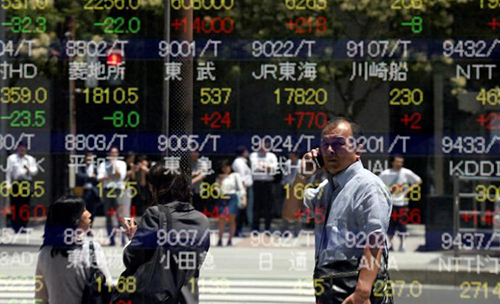Dollar caught in crossfire as Trump talks currency wars

SYDNEY - The dollar was put on the defensive in Asia on Wednesday after the Trump administration accused Germany and Japan of devaluing their currencies to gain a trade advantage, fuelling a risk-off mood that also kept stocks subdued.
The US currency suffered its worst January in three decades after President Donald Trump complained that every "other country lives on devaluation."
Just hours earlier his top trade adviser said Germany was using a "grossly undervalued" euro to exploit its trading partners. The accusations drew rebuttals from German and Japanese officials, but looked likely to run for some time.
"Suspicions that Washington may increasingly focus on the value of the dollar were catapulted into the limelight," ANZ analysts said in a note. "The early policy implication is that dollar competitiveness could have a prominent role to play in Trump's 'America First' agenda."
The dollar did recoup a little of its losses as the Asian session wore on, edging up to 112.94 yen from a low of 112.08, though that remained well short of Monday's 115.01 peak.
The euro was firm at $1.0793, having been as high as $1.0812 and a long way from Monday's trough of $1.0617. Against a basket of currencies, the dollar stood at 99.651, having ended January with a loss of 2.6 percent.
The jump in the yen kept Tokyo stocks flat, while MSCI's broadest index of Asia-Pacific shares outside Japan was 0.06 percent lower. Chinese markets were still on holiday but surveys from the Asian giant showed manufacturing and services activity continued to expand in January.
Exports from tech bellwether South Korea also grew at the fastest pace in almost five years, another sign the global economy had been on the mend before all the talk of US protectionism darkened the air.
FED ON HOLD
Investors' hopes for a fiscal boost to the world's largest economy under Trump have been tempered by controversial and protectionist policies that have seen him suspend travel to the United States from seven Muslim-majority countries.
The policy uncertainty only added to expectations the US Federal Reserve will keep interest rates steady when it concludes a two-day meeting later Wednesday.
The setback for Wall Street has been limited so far. While the S&P 500 fell on Tuesday for a fourth consecutive session, it still ended higher for the month. The Dow dipped 0.54 percent, while the S&P 500 lost 0.09 percent and the Nasdaq 0.02 percent.
Apple shares also jumped 3.3 percent after the bell as sales of iPhones beat expectations, helping lift Nasdaq e-mini futures NQc1 up 0.2 percent. Safe-haven bonds benefited from all the unease over Trump's policies and yields on 10-year Treasury debt eased to 2.46 percent from 2.48 percent early in the week.
The retreat in the dollar also boosted a range of commodities, with copper touching a two-month high CMCU3. Brent crude oil for April was quoted 10 cents lower at $55.48, while US crude eased 8 cents to $52.73. -Reuters







